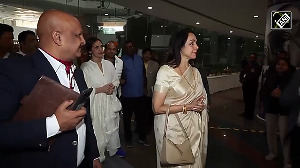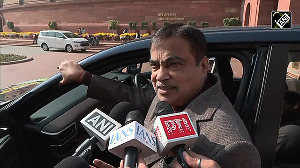Is Jaswant better than Manmohan? The question is bound to be asked as with each passing day, Finance Minister Jaswant Singh gets more confident, aggressive and ambitious, making it obvious to all that he has at last begun to enjoy the job that he had accepted in July 2002 rather reluctantly.
Indeed, the evolution of Jaswant Singh since his shift from South Block to North Block has been quite remarkable.
Initially, Mr Singh seemed very uneasy with numbers. Finance ministers are expected to revel in statistics. But here was a finance minister who shied away from them. He would not even hesitate to qualify his observations on economic issues at public meetings with the confession that he was not an economist.
Not surprisingly, he chose a new set of indices to capture the economy's progress. Instead of focusing on growth in the gross domestic product, he coined an abstract index of gross domestic contentment which he felt could be measured to assess how the economy was doing.
Similarly, his slogan to feed the poor and improve the householder's savings (Garib ke pet me dana aur grihini ke tukiya me anna) was a novel way for a finance minister to evaluate the well being of an economy.
Within the finance ministry, Jaswant Singh was different from many of his predecessors. He paid a lot of attention to improving the look of the corridors and his office in North Block. But his senior officials were never too pleased with him. One, he was not easily accessible.
Two, there was no stability in his top team. And three, he made some uncharitable comments about the calibre of civil servants, which by implication suggested that he had to settle for officers with whose competence he was not fully satisfied.
But all this changed with time. Today, Jaswant Singh is very easy with numbers. He still swears by gross domestic contentment as an index of real prosperity, but he is now more eloquent about the Indian economy recording GDP growth of over 8 per cent in 2003-04.
The finance minister also does not lose an opportunity to take credit for the reduction in the Centre's fiscal deficit and reiterates without batting an eyelid that the government can actually raise Rs 100,000 crore (Rs 1,000 billion) of resources every year from the market through divestment. If you question this estimate, he will smile back and urge you to have faith in his 'limited' skills with numbers.
He has also made peace with the civil servants. Just when almost the entire nation was praising him for his astute management of the economy, he said at a public meeting that he wouldn't have achieved what he did without the help and advice of his top team in the finance ministry.
What has not changed are his clear views on the continued need for subsidy for fertilisers and foodgrains supply through the public distribution system. Put simply, Jaswant Singh knows the importance of political packaging of economic reforms.
The 'India Shining' campaign was the first political attempt at selling economic reforms. Having achieved that, he is now busy reiterating the need for a strong dose of reforms like facilitating the flow of foreign direct investment in new sectors like retail trade and privatisation at a faster pace.
The question is: Has Jaswant Singh performed better than Manmohan Singh? As the finance minister in the Narasimha Rao government in the early 1990s, Manmohan Singh laid the foundations of India's economic reforms. He was an accomplished economist and had vast experience of economic administration.
The number of path-breaking economic policy measures that Dr Singh initiated, particularly in the first three years of his tenure, placed the government's reforms programme on an irreversible path.
True, Manmohan Singh failed to package his economic reforms in a manner that they became politically acceptable.
On more than one occasion, Dr Singh had to roll back a few of his reformist measures and face criticism from his own ministerial colleagues for introducing policies that cost them elections.
But his contribution to building a top stable team of economic administrators in the finance ministry is as yet unparalleled. He put in place a team of fine bureaucrats and economists at the helm of the finance ministry, which served not only him, but also two of his successors at North Block. On that score, Jaswant Singh has been a complete failure.
So, in spite of Jaswant Singh's stellar performance in steering the economy to a higher growth path with more reforms, it would be unfair to declare him as better than Manmohan Singh, who achieved much more under adverse circumstances at a time when the popular mindset was a barrier to economic policy change and the Congress was and continues to be mealy-mouthed about reforms.
But Jaswant Singh can certainly excel if he gets another stint as finance minister. The reasons are pretty obvious: Jaswant Singh as finance minister will enjoy even stronger backing of his political party and his prime minister.
Also consider the changing power equation of Mr Vajpayee with other members of the Sangh Parivar. In 1998, his first choice for the finance minister's job was Jaswant Singh. But the hard-liners in the Sangh Parivar forced him to change his mind. It was only in 2002 that he mustered enough courage to have Jaswant Singh in the finance minister's chair.
Today, it is a different scenario. On being asked how he will deal with the hardliners in Sangh Parivar, Mr Vajpayee can afford to say: "I do not have to deal with them."
Jaswant Singh, if retained as the finance minister, has a bright future.





